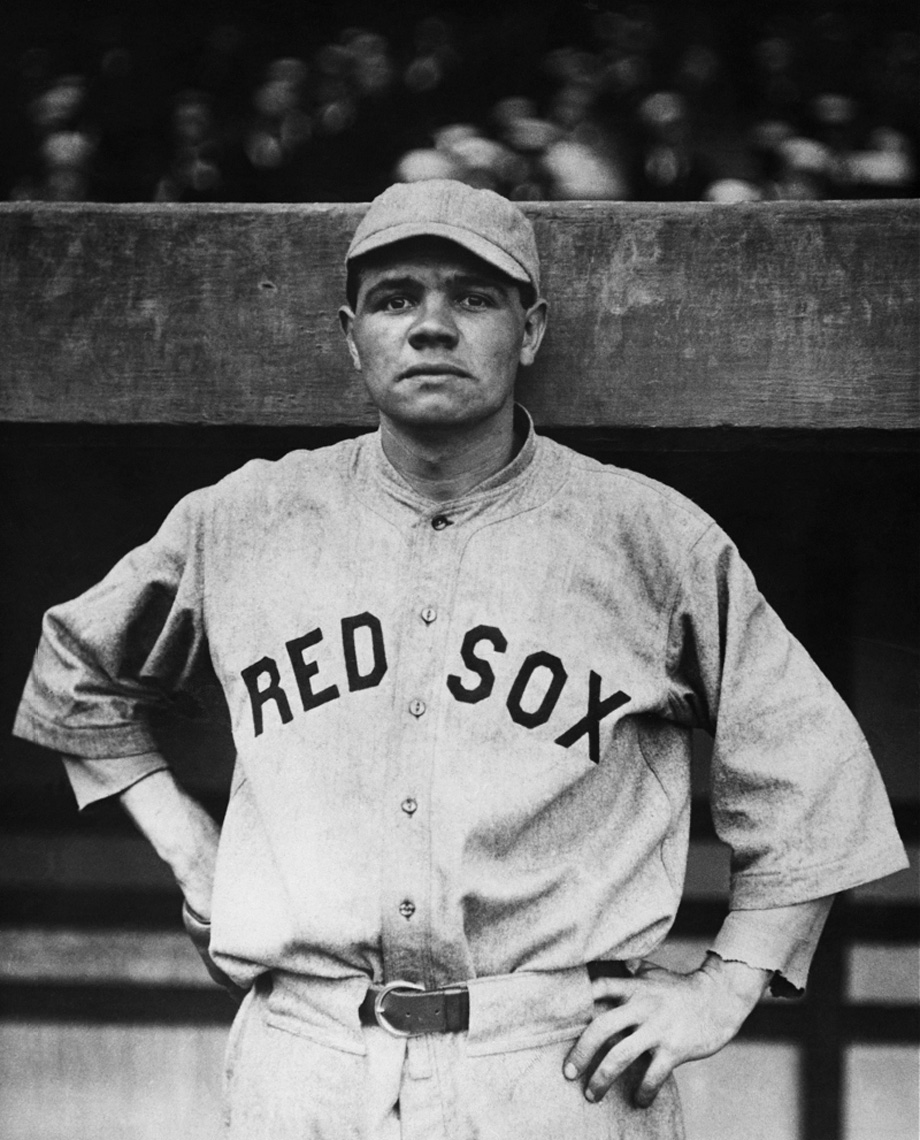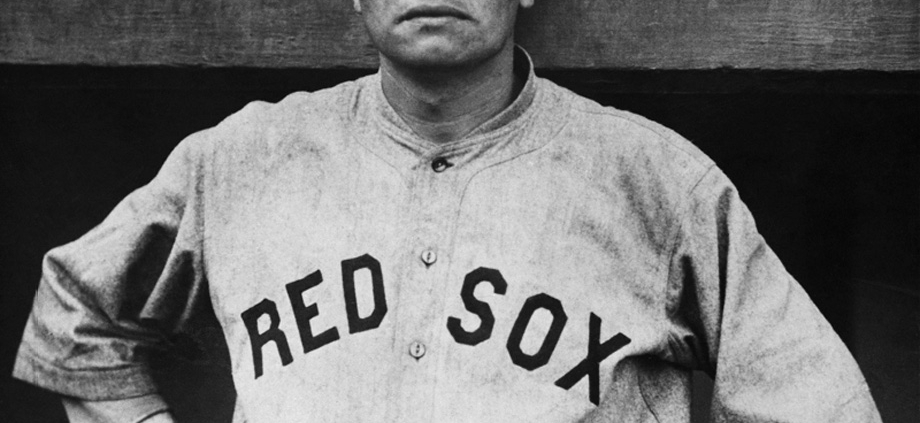April 12, 1916: Babe Ruth’s throwing error costs him an Opening Day shutout
 The Boston Red Sox opened their 1916 season at home. They were world champions after winning 101 games in 1915 and taking the World Series in five games over the Philadelphia Phillies.
The Boston Red Sox opened their 1916 season at home. They were world champions after winning 101 games in 1915 and taking the World Series in five games over the Philadelphia Phillies.
The team was largely unchanged from the prior year, though they were without two of their biggest stars: center fielder Tris Speaker and pitcher Smoky Joe Wood. Neither of the two had been willing to come to terms with owner Joseph J. Lannin, who had cut player salaries because the demise of the rival Federal League no longer prompted the inflation that owners had more or less been forced to ante up in 1914 and 1915.
Bill Carrigan was back as manager. Tillie Walker took Speaker’s place in center field. Chick Shorten was in left field; Duffy Lewis was not feeling well and was held out for another day. On the pitching staff, Carl Mays stepped up and became a regular starter.
Connie Mack’s Philadelphia Athletics were the visitors on Opening Day. They had won the 1914 American League pennant — their fourth title in five seasons, including three World Championships — but lost the World Series in four games to the “Miracle” Boston Braves. Their roster depleted by Federal League competition in 1915, they dropped to last in the AL.
The game was played at Fenway Park, though the 1915 World Series games in Boston had been played at the larger Braves Field. Ceremonies included the mayor of Boston and the governor of Massachusetts and a number of other political figures. The mayor threw out the first ball, which was dropped by umpire Bill Dinneen.1 There was a parade to the flagpole and the Ninth Regiment Band played the “Star-Spangled Banner.”
Left-hander Babe Ruth was Boston’s starting pitcher. Now 21 years old, he was 18-8 in 1915; he was essentially the third starter on that year’s staff but only marginally behind Ernie Shore and Rube Foster in his first full major-league season.
It had rained in the morning and was chilly, and there was talk of calling the game, but the decision was made to play. The weather, though, cut the crowd down to just 5,831.
Ruth kept the ball in the infield in the first, inducing each of the first three Philadelphia batters to ground out.
Athletics starter Jack Nabors allowed a leadoff single to right fielder Harry Hooper in the bottom of the inning. Shortstop Everett Scott bunted him to second base, and Hooper reached third on an error by Philadelphia first baseman Stuffy McInnis, but he did not score.
Neither team scored for the first four innings. Ruth allowed a double to McInnis in the second (and walked a batter), and another double to McInnis in the fourth, but no one scored. Nabors walked one in the second and walked two in the third. Ruth hit a ball that approached the right-field bleachers but was caught. Larry Gardner, Boston’s third baseman, singled in the fourth but never got past first base.
The Athletics’ third baseman Charlie Pick singled back to Ruth to lead off the fifth. Shortstop Sam Crane sacrificed him to second. Pinch-hitting for Nabors was Bill Stellbauer; he struck out. And while right fielder Jimmy Walsh was at bat, Pick tried to steal third but was tagged out when he overslid the bag.2
The new pitcher for the Athletics was Bullet Joe Bush, in his fourth full season for Philadelphia. He walked the first man he faced, catcher Pinch Thomas. Thomas stole second, but then Bush struck out both Ruth and Hooper and got Scott to ground out to Jack Barry at second base, Barry throwing the ball to first baseman Dick Hoblitzell. It was still 0-0 after five innings.
Ruth retired Walsh and the next two batters in the top of the sixth.
The Red Sox scored the first run of the game in the bottom of the sixth. Hoblitzell grounded to third base but was safe on Pick’s errant throw across the diamond. Hobby took second on the error.
Tillie Walker struck out, but left fielder Chick Shorten singled to left field, driving in Hoblitzell. Shorten was out trying to take second on the play, when Bush cut off the heave in and threw to second base. Gardner made the third out, but the Red Sox led, 1-0.
Ruth retired the side in the top of the seventh.
The Red Sox added a second run in the bottom of the inning. Jack Barry led off and singled to short. Pinch Thomas bunted back to Bush and was safe on a bad throw to first base. Then Babe Ruth bunted and again Bush misplayed the ball, the ball getting by him. The bases were loaded with nobody out.
Hooper grounded to Pick at third base, who fired the ball home to the catcher, Billy Meyer, for a force out.3 Scott hit a fly ball to right field, and Thomas tagged and scored. Hoblitzell flied out to left.
In the top of the eighth, Ruth struck out Pick, and then gave up a long fly ball to center field by Crane. Just for the fun of it, Walker showed off his arm and wowed reporters by throwing a strike all the way to home plate — the ball came in “dead on the line and hopping into Thomas’ hands, hardly six inches above the inside corner of the plate.”4 Ruth then struck out Bush, who batted for himself.
Walker singled leading off the bottom of the eighth, but that was followed by a strikeout, a force play at second, and a groundout.
Ruth took the mound in the top of the ninth. He walked Walsh, then struck out center fielder Amos Strunk. When the left fielder, Rube Oldring, hit the ball back to Ruth, the Red Sox pitcher knocked the ball down but then threw wide and low to second base and both runners were safe. The Boston Herald said that Walsh was likely to be safe anyhow and Ruth should not have rushed his throw.5 He was charged with an error.
Nap Lajoie singled to left-center field, scoring Walsh and depriving Ruth of a shutout. On Walker’s throw in to third base, which was on the money, Gardner couldn’t get a firm grip on the ball. Oldring was safe at third base and Lajoie took second.
It was 2-1, with two outs to get but the potential tying and go-ahead runs in scoring position. Carrigan called on Rube Foster to replace Ruth. McInnis hit the ball back to Foster, who threw home and trapped Oldring in a rundown. Lajoie took third and McInnis was on first base, but there were two outs.
Connie Mack had Whitey Witt pinch-hit for Billy Meyer. Witt hit the ball long and hard but Walker “covered ground in true Tris Speaker style and wound up the game with a swell catch” in deep center field.6 The Red Sox had survived.
Ruth got the win, Bush the loss.
The Athletics were a dim echo of their glory years but played a very good game on this day. Four errors hurt them; both of Boston’s runs were unearned. Philadelphia finished the 1916 season in last place once again, with an abysmal record of 36-117, a winning percentage of just .235. From 1915 to 1921, they were last seven years in a row.
The Red Sox were in first place for most of April, but spent most of May and June in either fourth or fifth place before finding their stride and climbing up to first place again on the next-to-last day of July.
The 1916 Red Sox won 10 fewer games than had the 1915 edition (91-63) but still won the American League pennant. In both seasons, it was tight at the top of the standings; they beat the Tigers by 2½ games in 1915 and the White Sox by two games in 1916. Once more, they needed only five games to win the World Series, this time beating the Brooklyn Robins.
Sources
In addition to the sources cited in the Notes, the author also consulted Baseball-Reference.com and Retrosheet.org.
www.baseball-reference.com/boxes/BOS/BOS191604120.shtml
www.retrosheet.org/boxesetc/1916/B04120BOS1916.htm
Notes
1 The sports page cartoon in the Boston Journal depicts Dinneen dropping the ball. Boston Journal, April 13, 1916: 9.
2 In early September 1916, Walsh was traded to the Red Sox, arriving in time to enjoy seeing his new team win the pennant.
3 Wally Schang had started the game as catcher, but a foul ball split his finger and — for the second opening day in a row — he was out with an injury.
4 Melville E. Webb, Jr., “Red Sox Star Like Champions,” Boston Globe, April 13, 1916: 6.
5 “Notes of the Game,” Boston Herald, April 13, 1916: 8.
6 “Walker Factor in Mack Defeat,” Philadelphia Inquirer, April 13, 1916: 12.
Additional Stats
Boston Red Sox 2
Philadelphia Athletics 1
Fenway Park
Boston, MA
Box Score + PBP:
Corrections? Additions?
If you can help us improve this game story, contact us.


